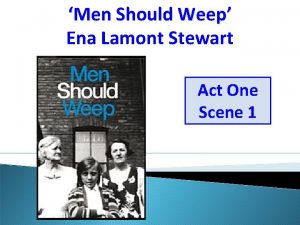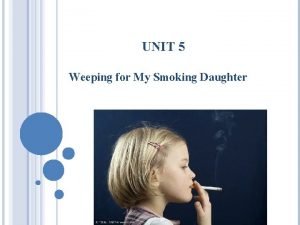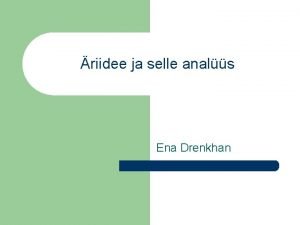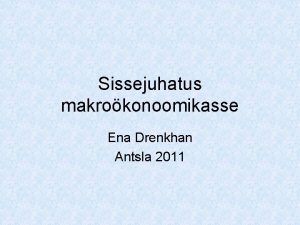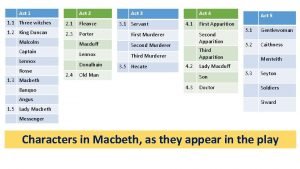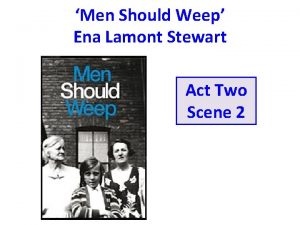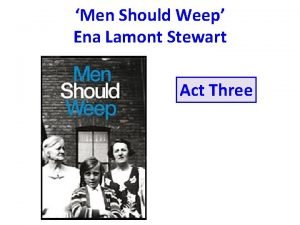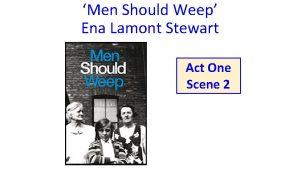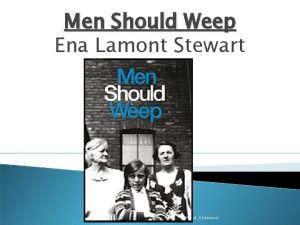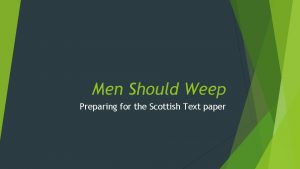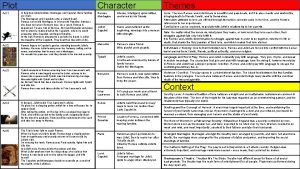Men Should Weep Ena Lamont Stewart Act Two
































- Slides: 32

‘Men Should Weep’ Ena Lamont Stewart Act Two Scene 1 Introduction to the play

Act Two, Sc 1 - Summary • The scene opens a week later with Granny being sent away to live with John's sister, Lizzie, earlier than planned as there is no room with Alec and Isa are also living there. Lizzie is portrayed as a hard-hearted character and greedy for Granny's pension. • After Granny's bed is taken by the removal men, Maggie arrives, grief-stricken as Bertie has been kept in hospital because of tuberculosis. Everybody sympathises, even Lizzie. • In the midst of this, Jenny packs her bags and leaves, as John arrives. • John complains bitterly about being born into poverty and the scene closes dramatically with an emotional speech.

Activity 1: Considering the impact of humour in ‘Men Should Weep’ In 1947, when the play was first performed, the Scotsman newspaper observed: ‘The audience felt at times that they were eavesdropping, so natural were the comings and goings and the see-sawing between comedy and tragedy. ’ Throughout the play, Ena Lamont Stewart uses humour to leaven the tragedy of the Morrison family’s situation. Act 2, Scene 1 is a good example of the way the mood in the play shifts between comedy and tragedy because it opens with the humorous interplay between the characters as they wait for Granny’s ‘flittin’ and ends with John’s climactic speech about being born into poverty.

Activity 1: Considering the impact of humour in ‘Men Should Weep’ How effective is the use of humour in the opening section of Act Two, sc 1 (p 28–top of p 36 when Maggie arrives home)? In Pairs: Consider the following points and make reference to such features as characterisation, dialogue, tone, innuendo and stage directions: • the interplay between Mrs Bone, Mrs Harris and Granny • Granny’s maudlin mood • Mrs Harris and Mrs Bone’s attitude towards Lizzie • Jenny and Isa’s impudence towards the older women • the removal men’s canny humour and their behaviour towards Jenny and Isa. Feedback

The neighbours as a Greek chorus In ancient Greek drama, the ‘chorus’ was a group of characters who did not function as individuals but as a collective ‘voice’, providing moral or dramatic comment on the behaviour and personalities of the characters. They tended to be dressed the same, often wearing masks, and chanting or singing the same lines. They provided another, less personal, perspective on the action of the play. The group of neighbours can be seen as a modern version of the Greek chorus. • Can you see similarities in the function they perform in ‘Men Should Weep’? • In what ways are they different?

Activity 2: The neighbours At the end of Act One, Maggie mentions the neighbours: we see how easy it is for them to fall out, living in such close proximity, but also how much the poor rely on each other to provide support of various sorts. At the beginning of Act Two, we see them in their glory.

Activity 2: The neighbours Looking at the opening of Act Two (p 28 -37), and thinking back to their appearance in Act One, explain how the neighbours demonstrate or provide: • Malicious gossip • Good-hearted concern • Examples of theme, for example, domestic abuse • Homespun philosophy • Comfort and stability, for example, for a vulnerable character • Criticism of men –’ the enemy’

Activity 2: The neighbours Possible Answers: Although they gain plenty of enjoyment from, for example, bringing home the latest story about Jenny, they also demonstrate genuine concern for one another, as in their concern for Maggie, Bertie, Mrs Bones and Granny. Mrs Bones is, of course, a victim of repeated domestic abuse: note that she never admits it (such things were accepted and not complained about openly).

Activity 2: The neighbours Possible Answers: Comments such as ‘When ye loss yer teeth, ye should loss yer appetite wi them’ show a humorous philosophical attitude, and there are many comments to Granny, for example, about how she will be missed. One thing that binds them together is their scorn for men as pathetic, feeble creatures: ‘…if their nebs is rinnin, they think they’re deein’.

Lizzie – a real villain? Although most of the characters in this play are a mixture of good and bad, like real people, Lizzie can be seen as a true villain. Where others are victims of poverty, she exploits the poverty of those around her. Even Alec and Isa, though selfish trouble makers, can be understood to an extent, but Lizzie has no real ‘back story’ to justify her hard, even cruel and malicious, behaviour.

Lizzie – a real villain? Right from her ‘peremptory knock’, (compare with Lily’s ‘brisk knock’), we can see that here is a demanding person, someone who is firmly focused on what she can get out of a situation. And yet, it is not that simple: she too has, to an extent, been moulded by poverty. Her harshness is perhaps her survival technique in a very difficult world.

Activity 3: Lizzie In pairs: You will be given a series of quotations from Lizzie’s only appearance in the play, in Act Two, scene 1. Cut up the quotes – do any of them have anything in common? Discuss and take notes on what each one reveals about her.

Activity 3: Lizzie Possible answers: 1. (Ignoring the others – to Granny) ‘Well? Ye ready? 5. ‘Ye’re jealous! Ye hevna the brains tae mak a bit yersels. ’ These quotes show that Lizzie lacks basic courtesy to the neighbours and treats them with contempt.

Activity 3: Lizzie Possible answers: 2. ‘Got a yer claes packed? An yer pension book? ’ 3. ‘Well it’s [the pension’s] no Maggie’s, it’s mines. If ye’re comin tae bide wi me, ye’re no comin tae bide aff me. ’ 4. ‘Folks that canna pay for their meat’ll find nae room in ma hoose. ’ 7. ‘I’m sittin right here till Maggie comes hame wi whit’s left o Granny’s pension. ’ 9. ‘Who says I’m no takin yon groceries? ’ These quotations are all about money and her desire to get it. She suspects that other people are cheating her out of it.

Activity 3: Lizzie Possible answers: 6. ‘Bide then!’ She shows no compassion or care towards Granny.

Activity 3: Lizzie Possible answers: 8. (To Lily) ‘Ye must hev an awfu nice boss … Or mebbe you’re awfu nice tae him, eh? ’ She is malicious-minded.

Activity 3: Lizzie Possible answers: 10. ‘Sorry about the wean, Maggie. Ye should hae went up wi him afore. ’ She cannot help making nasty remarks, blaming Maggie for the severity of bertie’s illness. There may actually be some truth in what she says, but it is terribly cruel of her to say it.

Activity 3: Lizzie Discuss: 1. The neighbours clearly do not like or accept Lizzie. Why do you think this is? 2. When Maggie returns, why does Lizzie not press her for the pension money? 3. Why does Lizzie take Granny at all, considering she clearly does not want to?

Lizzie 1. The neighbours clearly do not like or accept Lizzie. Why do you think this is? Although the neighbours sometimes argue among themselves, they have a loyalty to one another and help each other out. Lizzie stands out as an exploiter of ‘her own kind’ (who has even committed fraud and been in prison for her illegal exploitation) and so is rejected by the group. They turn their backs on her (not that she cares). 2. When Maggie returns, why does Lizzie not press her for the pension money? Even hard, uncaring Lizzie cannot quite push the ‘pension book’ issue in the face of Maggie’s extreme distress about Bertie.

Lizzie 3. Why does Lizzie take Granny at all, considering she clearly does not want to? She ‘has to take her turn’ of looking after Granny: there are unwritten rules which even she cannot break.

Jenny’s action in leaving home, when her mother is clearly devastated by Bertie’s illness, seems heartless. In a way, it is. Yet we can also see her point of view. The flat is overcrowded, the close dirty and embarrassing. She is humiliated by her mother turning up begging for damaged foods at the shop. Her dressing up, dyeing her hair, wearing make-up – seen as ‘tarty’ – show her longing for the glamour so missing from her life.

Jenny Note John’s reaction in Act One: scrubbing her face to remove the offensive make-up. Although a woman (in her own eyes), she is still treated as a child and the money she earns is not her own but put into the family funds. She is desperate to escape from a life of dirt and drudgery. But what does she escape to? Is Jenny at the end, though happier, any more in charge of her own destiny than her mother or grandmother?

Activity 4: Practice in textual analysis 1 You will be given a copy of the final section of Act Two, scene 1, from John’s speech starting ‘I ken, Maggie. I ken …’ (p. 40). Read the extract carefully and look for the ideas of the extract, including links to theme and specific language features such as word -choice, imagery, delivery of lines and tone, and stage directions. You are now going to annotate John’s speech: • use highlighter pens to highlight significant ideas and language features • make comments on these around the speech.

Activity 5: Practice in textual analysis 2 Read from ‘I dinna ken whit wey…’ to ‘I’m crying for Jenny’ in Act Two, sc 1 pp 38 -40. Answer the following questions: 1. How does Lamont Stewart use stage directions to convey the relationship between Maggie and Alec? 2 2. Analyse how the writer uses language to convey Jenny’s feelings about leaving home. 4 3. Analyse how language is used to contrast Maggie’s and John’s attitudes to Bertie’s situation. 4

Activity 5: Practice in textual analysis 2 Possible answers: 1. How does Lamont Stewart use stage directions to convey the relationship between Maggie and Alec? 2 • ‘He smooths her hair…her cheek’ – a rare gesture of affection from Alec provokes Maggie to look ‘gratefully’ at him – she is so thankful that he is showing her tenderness. It is an undemonstrative world, but she ‘lays his hand to her cheek’, a gesture full of unspoken devotion and trust. • ‘Alec disengages himself from his mother and grins feebly’ – he is embarrassed to be ‘caught’ by Isa showing affection to his mother. In the face of her scorn, his mother’s deep love for him is not important any more.

Activity 5: Practice in textual analysis 2 Possible answers: 1. How does Lamont Stewart use stage directions to convey the relationship between Maggie and Alec? 2 Ø 2 marks for a detailed / insightful comment plus a quotation / reference. Ø 1 mark for a more basic comment plus a quotation / reference. Ø 0 marks for a quotation with no comment. Ø Total 2 marks. (Marks can be gained 2 or 1+1)

Activity 5: Practice in textual analysis 2 Possible answers: 2. Analyse how the writer uses language to convey Jenny’s feelings about leaving home. 4 • ‘Well, I’m awa. Cheeribye everybody’ – her lively cheerfulness shows her eagerness to be away, amounting to heartlessness in the context of Maggie’s misery about Bertie and also about her leaving. • ‘If they’ve [the neighbours] got the impidence tae ask, tell them it’s nane o their bloomin business’ – expressions like ‘impidence’ and ‘nane o their bloomin business’ suggest defiance for what ‘the world’ thinks. By implication, she is also defying Maggie – none of her business either. • ‘I’m no in the mood for kissin’ - her breezily callous refusal to show love for Maggie and dismissive attitude to her mother’s love (which will later be so important).

Activity 5: Practice in textual analysis 2 Possible answers: 2. Analyse how the writer uses language to convey Jenny’s feelings about leaving home. 4 Ø 2 marks for a detailed / insightful comment plus a quotation / reference. Ø 1 mark for a more basic comment plus a quotation / reference. Ø 0 marks for a quotation with no comment. Ø Total 4 marks. (Marks can be gained 2=2 or 2+1+1 or 1+1+1+1)

Activity 5: Practice in textual analysis 2 Possible answers: 3. Analyse how language is used to contrast Maggie’s and John’s attitudes to Bertie’s situation. 4 • Maggie: ‘John they’ve kept him in’ – a short, dramatic statement that reveals her stunned, pained reaction. ‘I didna want…’ – repetition emphasises her pain; ‘He’ll be feart! He’ll be cryin for his mammy!’ – conjures up a painful picture of little Bertie, scared and alone, and shows the imaginative focus on her sick son. • John: ‘but it’s better, Maggie, it’s better’ – repetition, reassuring / comforting her; focusing not on the pain of now but, rationally, on being sensible about what is best. • ‘He’ll be cryin … cryin for Jenny’ - slightly selfish; focus on his own pain, not that of his child.

Activity 5: Practice in textual analysis 2 Possible answers: 3. Analyse how language is used to contrast Maggie’s and John’s attitudes to Bertie’s situation. 4 Ø 2 marks for a detailed / insightful comment plus a quotation / reference. Ø 1 mark for a more basic comment plus a quotation / reference. Ø 0 marks for a quotation with no comment. Ø Total 4 marks. (Marks can be gained 2=2 or 2+1+1 or 1+1+1+1)

Activity 6 - Act 2 Scene 1 1. Why is Granny complaining at the start of the scene? 2. Is she justified in her complaints? 3. What has happened to Mrs Bone? 4. Why does Lizzie ask to see Granny’s pension book? 5. Is Lizzie married? 6. What does Lizzie do to make money? 7. Is Lizzie an honest character? 8. Describe Isa’s character. 9. Why does Granny get upset with Isa? 10. Why is Maggie sobbing when she appears?

Activity 6 - Act 2 Scene 1 11. How serious was TB in the 1930 s? 12. Describe Alec’s character. 13. Why is Maggie worried about people finding out that Bertie has TB? 14. Why does John think that Jenny is ‘as good as deid tae us’? 15. Why does John feel sorry for himself? 16. Do you have sympathy for John Morrison? 17. What would the original audience’s reaction (in 1947) have been to Jenny’s departure? 18. What is your reaction? 19. Do you admire Jenny or pity her? Why? 20. How many characters appear in this scene?
 Men should weep quotes
Men should weep quotes Men should weep characters
Men should weep characters Men should weep notes
Men should weep notes Mike lamont
Mike lamont Mike lamont cern
Mike lamont cern Donal lamont
Donal lamont Cafe lamont ballymena
Cafe lamont ballymena Leadership vs management
Leadership vs management In the poem to daffodils the poet is addressing to
In the poem to daffodils the poet is addressing to Retaining wall
Retaining wall The clothes poem by mongane wally serote analysis
The clothes poem by mongane wally serote analysis Weep smoke
Weep smoke The alchemist why does the lake weep for narcissus
The alchemist why does the lake weep for narcissus Is this the promised end king lear
Is this the promised end king lear Ena na dan
Ena na dan Ena.lu
Ena.lu Abitreenit englanti
Abitreenit englanti Ena huddle
Ena huddle Ena polovica
Ena polovica Sistem ena
Sistem ena Ena drenkhan
Ena drenkhan Dan ena
Dan ena Alkena
Alkena Ena 2011
Ena 2011 Ena drenkhan
Ena drenkhan Maria soñe que tu niño
Maria soñe que tu niño Arabuli ena
Arabuli ena Ena na dan
Ena na dan White men are saving brown women from brown men
White men are saving brown women from brown men Act 1 act 2 act 3
Act 1 act 2 act 3 Banquo quotes
Banquo quotes Reynaldo hamlet
Reynaldo hamlet When does macbeth revisit the witches
When does macbeth revisit the witches

